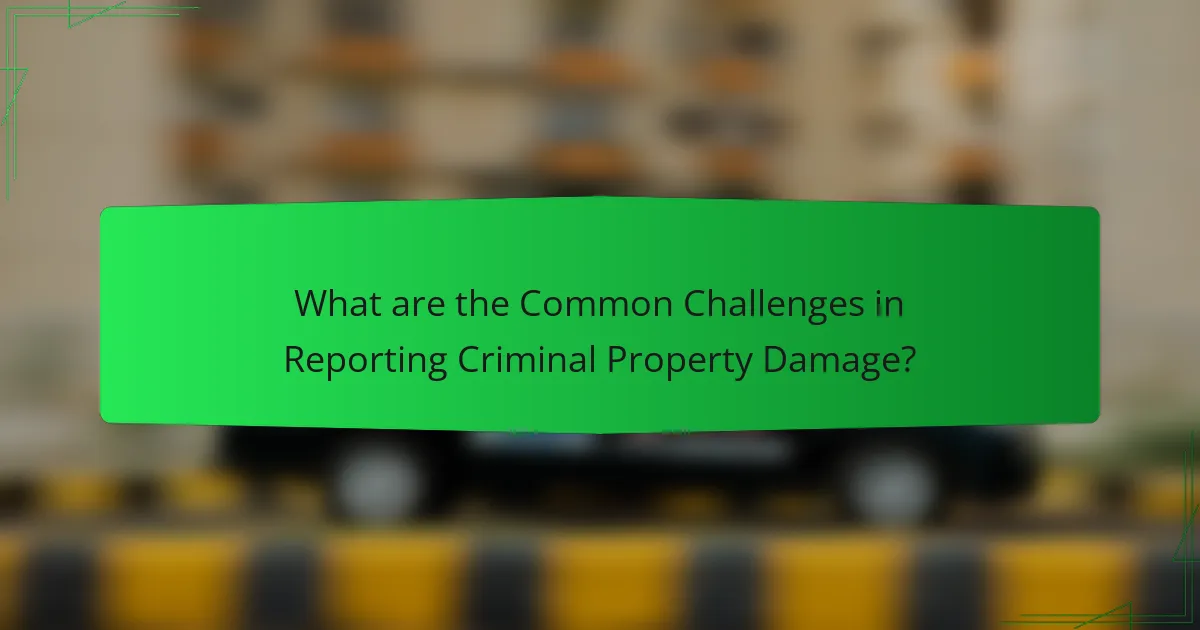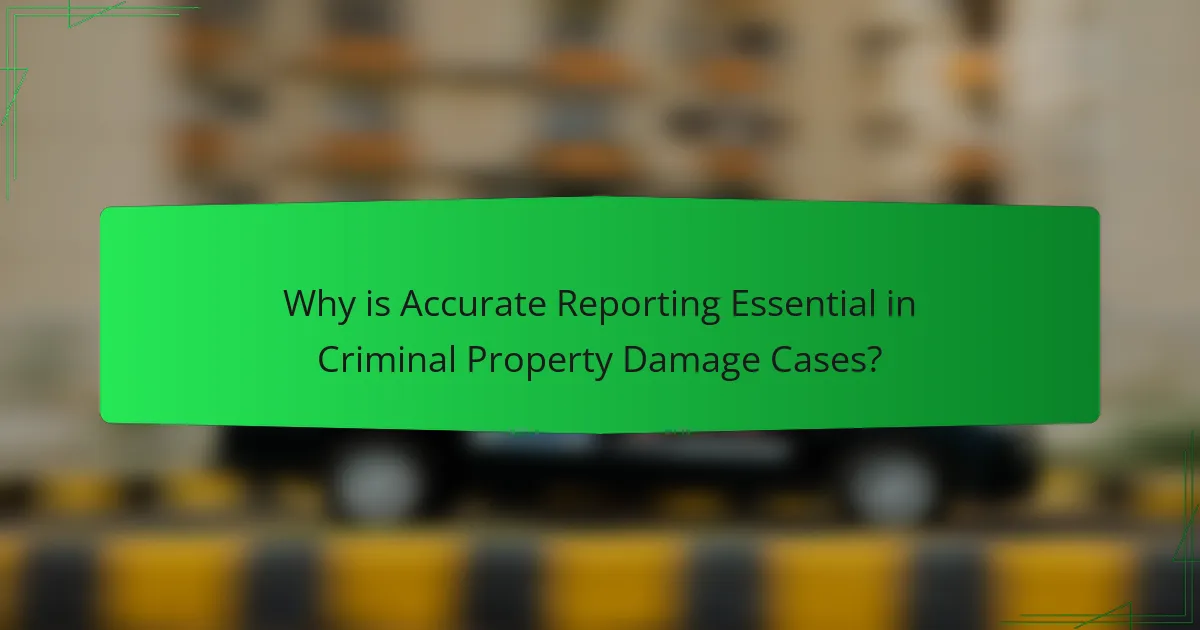The article addresses the common challenges faced in reporting criminal property damage, focusing on issues such as underreporting, lack of evidence, and procedural complexities. Victims often hesitate to report incidents due to fear of retaliation or emotional distress, while varying laws across jurisdictions complicate the reporting process. Accurate reporting is crucial for ensuring justice, as it aids law enforcement in identifying suspects and supports victims in navigating insurance claims. The article emphasizes the importance of clear communication, proper documentation, and understanding legal requirements to enhance the reporting process and improve legal outcomes.

What are the Common Challenges in Reporting Criminal Property Damage?
Common challenges in reporting criminal property damage include underreporting, lack of evidence, and procedural complexities. Underreporting occurs due to victims feeling discouraged or fearing retaliation. Lack of evidence can hinder investigations, making it difficult for authorities to take action. Procedural complexities arise from varying laws and requirements across jurisdictions. Victims may also face challenges in navigating insurance claims. Additionally, emotional distress can impact a victim’s ability to report incidents promptly. These factors collectively complicate the reporting process and can lead to insufficient responses from law enforcement.
How do legal hurdles impact the reporting process?
Legal hurdles significantly impede the reporting process of criminal property damage. These obstacles can include complex laws, lengthy procedures, and potential liability concerns. Legal requirements may deter victims from reporting incidents promptly. Fear of legal repercussions can also lead to underreporting of crimes. Additionally, navigating legal frameworks can prolong the investigation process. This can result in lost evidence and diminished chances of resolution. Legal hurdles often create confusion among victims regarding their rights and responsibilities. Consequently, these challenges can undermine the overall effectiveness of law enforcement responses.
What specific legal requirements must be met when reporting criminal property damage?
To report criminal property damage, specific legal requirements must be met. The individual must provide a detailed description of the damage. This includes the location, extent, and nature of the damage. It is essential to report the incident to law enforcement promptly. Many jurisdictions require this report to be made within a specific timeframe, often within 24 to 72 hours. The report should include any relevant evidence, such as photographs or witness statements. In some cases, insurance companies may also require a copy of the police report for claims processing. Failure to meet these legal requirements can impact potential restitution or insurance coverage.
How do jurisdictional differences affect reporting procedures?
Jurisdictional differences significantly affect reporting procedures by establishing varied legal frameworks and requirements. Each jurisdiction may have distinct laws governing the reporting of criminal property damage. These laws can dictate who must report incidents, the timeline for reporting, and the required documentation. For example, some jurisdictions may require immediate reporting to law enforcement, while others may allow for delayed reporting. Additionally, the definitions of criminal property damage may vary, influencing how incidents are categorized and processed. These differences can lead to confusion for victims and law enforcement. Studies indicate that inconsistencies in reporting procedures can result in underreporting of incidents, complicating crime statistics and resource allocation.
What procedural missteps are frequently encountered?
Procedural missteps frequently encountered include failure to document evidence properly. This can lead to insufficient proof of damage. Additionally, delays in reporting incidents can hinder investigations. Lack of clarity in witness statements often complicates cases. Incomplete or inaccurate forms can result in legal challenges. Miscommunication between law enforcement and victims may cause further issues. Lastly, overlooking deadlines for filing claims can impede recovery efforts. Each of these missteps can significantly impact the outcome of property damage reporting.
What are the common mistakes made during the documentation of damage?
Common mistakes made during the documentation of damage include inadequate detail and lack of evidence. Incomplete descriptions fail to capture the full extent of the damage. Missing photographs can lead to disputes about the condition of the property. Not recording the timeline of events can cause confusion about when the damage occurred. Failing to document witness statements may result in a lack of corroborative support. Using non-standard terminology can create misunderstandings in legal contexts. Lastly, neglecting to keep copies of all documentation can hinder future claims or legal proceedings.
How can reporting timelines affect the outcome of claims?
Reporting timelines significantly influence the outcome of claims. Timely reporting ensures that evidence is preserved and witnesses are available. Delays can lead to lost documentation and diminished credibility. Insurance companies often have specific deadlines for claim submissions. Missing these deadlines can result in claim denial. Furthermore, prompt reporting allows for quicker investigations. This can expedite the claims process and increase the likelihood of approval. Studies show that claims reported within 24 hours have a higher success rate. Adhering to reporting timelines is crucial for favorable claim outcomes.

Why is Accurate Reporting Essential in Criminal Property Damage Cases?
Accurate reporting is essential in criminal property damage cases to ensure justice and accountability. Precise details help law enforcement understand the incident fully. This clarity aids in identifying suspects and establishing motives. Accurate reports also support insurance claims, ensuring victims receive rightful compensation. Furthermore, reliable documentation can strengthen legal proceedings in court. Inaccurate reporting can lead to wrongful accusations or dismissed cases. Studies show that detailed reports increase conviction rates by providing necessary evidence. Therefore, accuracy in reporting is vital for effective legal outcomes.
How does accurate reporting influence legal outcomes?
Accurate reporting significantly influences legal outcomes by providing reliable evidence in court cases. It establishes a factual basis for claims and defenses. Precise details in reports can affect the credibility of witnesses and the overall case. For example, accurate timelines and descriptions can corroborate testimonies. This corroboration can lead to stronger cases for prosecution or defense. Studies show that accurate documentation increases the likelihood of favorable verdicts. Inaccurate reporting, on the other hand, can lead to wrongful convictions or dismissals. Reliable data is essential for fair legal processes.
What role does evidence collection play in supporting claims?
Evidence collection is crucial in supporting claims related to criminal property damage. It provides the necessary documentation to validate assertions made by victims. Collected evidence can include photographs, witness statements, and police reports. This information helps establish the circumstances surrounding the damage. Accurate evidence strengthens the credibility of the claims presented. Legal systems rely on this evidence to assess liability and determine compensation. For instance, a study by the National Institute of Justice emphasizes that thorough evidence collection significantly influences case outcomes. Proper evidence can directly impact the success of legal proceedings.
How can inaccuracies in reporting lead to legal complications?
Inaccuracies in reporting can lead to significant legal complications. Incorrect information may result in wrongful accusations against individuals. This can lead to defamation lawsuits if the reported inaccuracies harm someone’s reputation. Additionally, inaccurate reports can hinder investigations, causing delays in legal proceedings. Law enforcement may rely on flawed data, which can affect case outcomes. In some cases, inaccuracies can lead to charges being dropped due to lack of credible evidence. Furthermore, organizations may face liability issues if their reporting fails to meet legal standards. Accurate reporting is crucial for maintaining justice and accountability in legal contexts.
What are the potential consequences of failing to report accurately?
Failing to report accurately can lead to severe legal consequences. Inaccurate reporting may result in criminal charges against the individual for providing false information. This could include penalties such as fines or imprisonment, depending on the jurisdiction. Additionally, inaccurate reports can hinder law enforcement investigations. This may prevent the recovery of stolen property or the apprehension of suspects. Victims may also face difficulties in claiming insurance benefits. Insurance companies often require accurate documentation for claims processing. Lastly, inaccurate reports can undermine public trust in law enforcement and reporting systems. This can have long-term implications for community cooperation and safety efforts.
What legal repercussions can arise from improper reporting?
Improper reporting can lead to various legal repercussions. Individuals may face criminal charges for filing false reports. This can result in fines or even imprisonment, depending on jurisdiction. Additionally, civil liability may arise from damages caused by the false report. Victims of improper reporting may sue for defamation or emotional distress. Insurance claims can also be denied if improper reporting is discovered. Legal repercussions can vary by state laws and the specifics of the case. Accurate reporting is essential to avoid these potential consequences.
How can inaccurate reporting affect insurance claims?
Inaccurate reporting can significantly impact insurance claims. It may lead to claim denials or reduced payouts. Insurers rely on accurate information to assess the validity of a claim. Misstatements can create doubts about the credibility of the claim. For instance, if damage is reported inaccurately, the insurer might question whether the event occurred as described. According to a study by the Insurance Information Institute, 20% of claims are delayed due to inaccurate or incomplete information. This can prolong the claims process and increase frustration for the policyholder. In severe cases, it can even result in legal action against the claimant for fraud.

What Best Practices Can Help Navigate Reporting Challenges?
Establishing clear communication is essential for navigating reporting challenges. It ensures all parties understand the requirements. Accurate documentation of incidents is critical. This includes gathering evidence and witness statements. Familiarizing oneself with legal requirements aids in compliance. Understanding jurisdictional differences can prevent procedural errors. Seeking guidance from legal professionals is advisable for complex cases. Regular training on reporting procedures enhances staff preparedness. Utilizing technology for reporting can streamline the process and reduce errors.
How can individuals prepare for reporting criminal property damage?
Individuals can prepare for reporting criminal property damage by gathering all relevant evidence. This includes taking clear photographs of the damage from multiple angles. They should also document the time and date of the incident. Noting any witnesses and their contact information is essential. Individuals should write a detailed account of what happened. This account should include any suspicious activity observed. Having a copy of the police report from previous incidents can be helpful. Finally, knowing the local laws regarding property damage can aid in the reporting process.
What steps should be taken immediately after the incident occurs?
Ensure safety first. Check if anyone is injured and call for medical assistance if needed. Secure the area to prevent further damage or injury. Document the incident by taking photographs of the scene and any damages. Gather witness information, including names and contact details. Report the incident to local authorities promptly. File a police report, providing all necessary details. Notify your insurance company about the incident as soon as possible. Keep records of all communications and documents related to the incident for future reference.
How can gathering evidence in advance streamline the reporting process?
Gathering evidence in advance can significantly streamline the reporting process. It allows for a more organized presentation of facts. When evidence is collected beforehand, it reduces the time spent on gathering information post-incident. This proactive approach minimizes delays in filing reports. Additionally, having solid evidence enhances the credibility of the report. It can lead to quicker investigations and resolutions. Studies show that cases with pre-gathered evidence have higher success rates in prosecution. Efficient evidence collection also helps in meeting legal requirements more effectively.
What resources are available to assist with the reporting process?
Resources available to assist with the reporting process include law enforcement agencies, legal aid organizations, and online reporting tools. Law enforcement agencies provide guidance on how to file a report and what information is required. Legal aid organizations can offer assistance with understanding legal rights and navigating the legal system. Online reporting tools may simplify the process by allowing individuals to submit reports electronically. Additionally, victim support services can provide emotional support and advice during the reporting process. These resources are designed to help individuals effectively report criminal property damage and ensure their concerns are addressed.
How can legal professionals aid in navigating reporting challenges?
Legal professionals can assist in navigating reporting challenges by providing expert guidance on legal requirements. They can help individuals understand the specific laws related to criminal property damage. Legal professionals can ensure that all necessary documentation is correctly prepared and submitted. They can also advise on the appropriate channels for reporting incidents. Additionally, they can represent clients during any legal proceedings related to property damage. Their expertise can help in identifying potential legal pitfalls during the reporting process. By offering legal insights, they can facilitate smoother communication with law enforcement and insurance companies. This support ultimately helps clients navigate complex legal landscapes effectively.
What community resources can provide support during the reporting process?
Community resources that can provide support during the reporting process include local law enforcement agencies, legal aid organizations, and victim support services. Local law enforcement agencies assist individuals in filing reports and provide guidance on legal procedures. Legal aid organizations offer free or low-cost legal advice to help navigate the reporting process. Victim support services provide emotional support and resources to victims of crime. These resources are essential for ensuring that individuals understand their rights and the steps they need to take.
What tips can improve the accuracy of reported information?
To improve the accuracy of reported information, verify facts through multiple reliable sources. Cross-referencing data helps identify discrepancies. Use primary sources when possible, such as official documents or eyewitness accounts. Maintain clear and precise language to avoid misinterpretation. Document all findings and sources for transparency. Regular training on reporting standards enhances accuracy. Employ fact-checking tools and software to catch errors. Finally, encourage feedback from peers to identify potential inaccuracies.
The main entity of the article is criminal property damage reporting. This article outlines the common challenges faced by victims, including underreporting, lack of evidence, and legal complexities that hinder the reporting process. It details specific legal requirements, jurisdictional differences, and procedural missteps that can affect the accuracy and effectiveness of reports. Additionally, it emphasizes the importance of accurate reporting for legal outcomes and insurance claims, while providing best practices and resources to assist individuals in navigating these challenges effectively.